Meta Stock
| Instrument:META |
Trade Facebook Stock
At just 19 years old, Mark Zuckerberg founded Facebook while he was still a psychology student at Harvard University. As an avid computer programmer, Zuckerberg had already been successful in the development of several social networking sites for his fellow students, including Coursematch and Facemash.
In February 2004, Mark launched what was then known as “The Facebook.” This name was a digital update to the sheets of paper that Harvard University distributed to its freshmen, containing profiles of staff and students. The Facebook was an instant hit – 1,200 students signed up in its first 24 hours and, in just one month, more than half of the total undergraduate population of the university had a profile.
Facebook Stock Trading Information:
- MT4 Facebook Stock Symbol: #FACEBOOK
- Trading Hours: 13:30 – 19:59 GMT
- Currency: USD
- Leverage up to:
Start trading Facebook Stock now or practice on a free demo account risk free!
Between 2004 and 2006, the network extended to other educational institutions and, eventually, it was opened to any user with a registered email address. Its name was also changed to “Facebook” in 2005, and it grew exponentially over the years until it finally went public in 2012. To this day, Facebook remains free of charge for anyone to join, as the social network’s main stream of revenue is advertising.
Following its 2012 initial public offering (IPO), the company has kept a high profile thanks to the rapid and relatively smooth rise in the Facebook stock value. Facebook is a part of the FAANG; a group of the five best performing and popular tech stocks, being Facebook (FB), Amazon (AMZN), Apple (AAPL), Netflix (NFLX), and Alphabet’s Google (GOOG).
Facebook’s original headquarters were opened in Palo Alto, California in 2005. However, after a decade of rapid growth and expansion, the company relocated to its current home; the Sun Microsystems’ former campus in Menlo Park, also based in California.
Facebook Stock History
In a long-awaited move, Facebook filed with the Securities and Exchange Commission (SEC) on February 1, 2012, for an initial public offering. By this point, the company had announced net revenue of more than $1 billion in 2011, a 65% increase compared to 2010. At the same time, the social network also boasted a total active user base of 845 million as well as 483 million active daily users.
According to the SEC filing, Mark Zuckerberg would retain a 22% stake in the company following the IPO and would also hold 57% of the voting rights. The 421,233,615 shares to be offered were priced at $38 each, in effect valuing the company at $104 billion, and their sale would raise $16.007 billion. This made it one of the highest valuations in history for a newly public company. In the years following the IPO, Facebook stock continued to perform strongly, and in mid-2018, the company’s market cap reached close to $500 billion. Facebook shares can be traded on the Nasdaq under the ticker FB.
As the company has grown over the years, it has been part of many merger and acquisition deals. Some companies were absorbed into Facebook, while others have retained their identities and businesses as Facebook-owned operations. The most well-known acquisitions and mergers by Facebook include Instagram, WhatsApp, FriendFeed, Drop.io, Oculus, Hot Studio, Lightbox.com, Divvyshot and Karma, among others. Although many stakeholders in large companies use dividend payments as a measure of the health of the company, Facebook does not pay out regular dividends. This is quite common within the entire tech sector, which prefers to plough the funds back into their businesses to improve them and increase shareholder value. However, in 2016, the social networking company did pay out a special dividend on its class C shares. As of 2018, this remained the company’s only dividend payout to date.
Following the announcement of its Q2 results in mid-2018, FB stock dropped almost 20%, shedding over $120 billion from the company’s value. This was due to the poorer-than-expected financial performance during the quarter and a projected rise in costs. Overall, compared to the same period in 2017, there was an 11% rise in the average number of daily users, and revenues rose by 42% to $13.2 billion in Q2 of 2018, below analysts’ projections of $13.3 billion. The lower numbers came as a surprise, as the last time Facebook missed its quarterly projections was back in Q1 of 2015.
Another reason for the drop in its share price was that the financial results were released following a period of harsh scrutiny over its data-privacy policies, which resulted in Zuckerberg being summoned to testify before the U.S. Congress. Despite Facebook’s troubles, there is still a strong, positive case for the company’s long-term outlook. The social network also holds a commanding position regarding online and mobile advertising, since it possesses one of the most valuable data sets on what users are interested in.
How to Trade Facebook Stocks
Although Wall Street widely bashed the Q2 2018 report, the company still remains the dominant force within the social media space and generally has good long-term growth prospects. This bodes well for long-term investors in Facebook shares.
However, the company’s woes, as well as the factors outlined below, also provide a level of volatility that should present medium and short-term traders with plenty of trading opportunities as well:
- Legislative Policy Changes
There is constant scrutiny of Facebook, and social media as a whole by the US and the EU to clamp down on fake accounts, hate speech, and fake news. There are also ever-evolving laws around privacy and user data, such as the General Data Protection Regulation (GDPR) in Europe, enacted on May 25, 2018. When privacy issues or breaches occur with Facebook, often their stock price is the first thing to take a hit.
- Competitor’s Performance
Social media is very much a part of our lives and society today. The threat of new social media competitors is very real. When social media companies like Snapchat and Twitter broke onto the scene, it would have been hard to imagine they would have had an impact on Facebook. However, these smaller players do impact Facebook’s revenues, and the potential for other new social media companies to enter the playing field at any time, is possible.
- Effect of Facebook-Owned Products / Services
In 2018, Instagram and WhatsApp, two Facebook-owned properties, reported having a billion active users each. While Facebook does not disclose how much it earns from Instagram, it is estimated that Instagram’s profits contribute billions to Facebook’s bottom line. Facebook also launched Oculus Go in 2018, a $199 virtual reality headset, and it’s estimated to have moved about 290,000 units in Q2 of 2018, generating about $57 million in revenue. For investors in Facebook, it is important to not only monitor Facebook themselves, but also the other companies and services they own that can impact the stock’s performance.
Disclaimer: This is a general analysis and not to be viewed or construed as actual trading advice or a recommendation of any kind and just an example of how a particular instrument could, potentially, be traded.
Why Trade Facebook Stocks with Friedberg Direct
- Enjoy the benefits and peace of mind that comes with CFDs trading with a regulated Canadian broker.
- Leveraged trading that allows you to trade Facebook stock CFDs with smaller upfront capital costs, while potentially earning high returns on your investment.
- Short selling Facebook CFDs allows you to make a profit even when the stock price drops, as it did in July 2018.
- AvaTrade’s intuitive and powerful trading platforms give you all the tools to trade effectively, plus the flexibility to trade on mobile.
- Benefit from our enhanced execution and pricing as you implement your own CFD trading strategies.
- Friedberg Direct’s CFDs offer you some of the tightest spreads available on Facebook stock, which means better ROI.
Trade Facebook stock and other CFDs within our safe, secure, all-inclusive trading environment. Start Trading Online Now!
Facebook Stock Main FAQs
- What should I know about Facebook?
Facebook is one of the world’s most popular social media platforms, and Facebook as a company is one of the most valuable in the world as well. Facebook is the “F” in the FAANG stocks, but since 2017 the stock hasn’t been such a great performer, instead trading sideways in a fairly large range. As of 2020 it looks like the stock might be breaking out, but that’s could quickly turn as Facebook tends to volatility based on news and other fundamental factors.
- Is Facebook a good stock to trade?
Because of the ups and downs common from Facebook it is a good stock to trade. The company also remains controversial, which keeps it in the news constantly, and helps to boost the volatility of Facebook stocks. This heightened volatility means that traders can more easily take advantage of price moves in Facebook stock. Some traders look to short Facebook stocks after a strong rally, while others like to wait for a pullback to buy stocks relatively cheaply.
- What is the best strategy for trading Facebook?
Facebook is considered to be one of the better stocks for swing traders due to its regular rallies and pullbacks. That price action and the excellent liquidity of Facebook stocks make it an easy swing trading target. Facebook stock traders like to follow the clear trendlines seen in Facebook stocks as the stock moves back and forth in its large range. The clear trends up or down make it a simple task to enter a position for several days and then exit with a profit. If the trend line is broken during the trade an exit is made immediately to limit potential losses.
Disclaimer: Please note these are stock CFDs (Contracts for Difference)
When you enter into a CFD trade you don’t buy the actual stock itself but instead agree on a contract with the broker to settle the difference in value between the entry and exit price of the Stock based on the price the stock is trading at on the Exchange it is listed. That means when you trade Stocks CFDs with Friedberg Direct you get a flexibility that stock market rules often make very difficult or even impossible for some.







